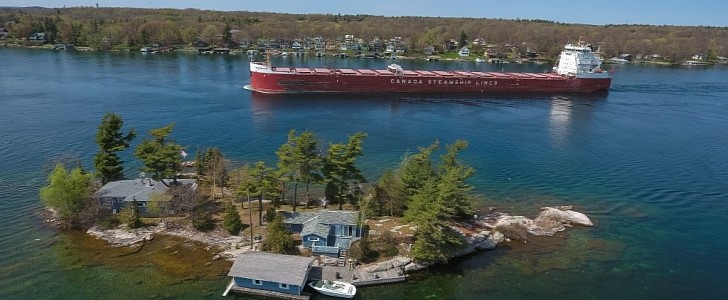A Canada-based provider of marine cargo delivery services recently completed its first extensive trials of biodiesel on marine engines, which is not only a premiere for the Great Lakes shipping industry, but also a record-setting performance, as the world’s biggest trials of this kind.
At the beginning of 2021, CSL officially announced that it will be testing biodiesel on half of its entire fleet, throughout the 2021 navigation season. This wasn’t the first step towards the sustainability of the marine cargo operator, who is also the world’s largest operator of self-unloading vessels. In 2020, it conducted successful biodiesel trials on the main engines of two of its ships. These new trials were going to build upon that success, through large-scale operations over a much longer period of time.
The Canadian company completed these tests at the end of November, with remarkable findings – using biofuel would result in a 23% CO2 emissions cut throughout the entire fleet life cycle, compared to marine gas oil (MGO). Running for a total of almost 30,000 hours, these tests became the longest-running trials in the world of biodiesel on marine engines. Eight ships used B100 second-generation biodiesel on both main and auxiliary engines, over the course of six months.
The trials were carried out under a Transport Canada testing protocol, with emission cuts calculated using the official GHGenius tool provided by the Canadian government. The biofuel that was used came entirely from North American sources. Unlike first-generation biofuels, which are obtained directly from crops, such as cereals or sugar cane, second-generation biodiesel is even more sustainable, because it’s obtained from plant waste, also known as non-food biomass.
Despite the success of the extended trials, CSL considers biofuel of any kind only a temporary solution, until innovative ships can fully replace existing fleets. CSL itself is building a diesel-electric self-unloading ship, equipped with “the most advanced environmental technologies,” which will operate in the delicate maritime environment of the Magdalene Islands for the salt mining sector.
Until new technologies and digital solutions can fully replace conventional vessels, biodiesel is seen as the best answer for immediate carbon reductions.
The Canadian company completed these tests at the end of November, with remarkable findings – using biofuel would result in a 23% CO2 emissions cut throughout the entire fleet life cycle, compared to marine gas oil (MGO). Running for a total of almost 30,000 hours, these tests became the longest-running trials in the world of biodiesel on marine engines. Eight ships used B100 second-generation biodiesel on both main and auxiliary engines, over the course of six months.
The trials were carried out under a Transport Canada testing protocol, with emission cuts calculated using the official GHGenius tool provided by the Canadian government. The biofuel that was used came entirely from North American sources. Unlike first-generation biofuels, which are obtained directly from crops, such as cereals or sugar cane, second-generation biodiesel is even more sustainable, because it’s obtained from plant waste, also known as non-food biomass.
Despite the success of the extended trials, CSL considers biofuel of any kind only a temporary solution, until innovative ships can fully replace existing fleets. CSL itself is building a diesel-electric self-unloading ship, equipped with “the most advanced environmental technologies,” which will operate in the delicate maritime environment of the Magdalene Islands for the salt mining sector.
Until new technologies and digital solutions can fully replace conventional vessels, biodiesel is seen as the best answer for immediate carbon reductions.






